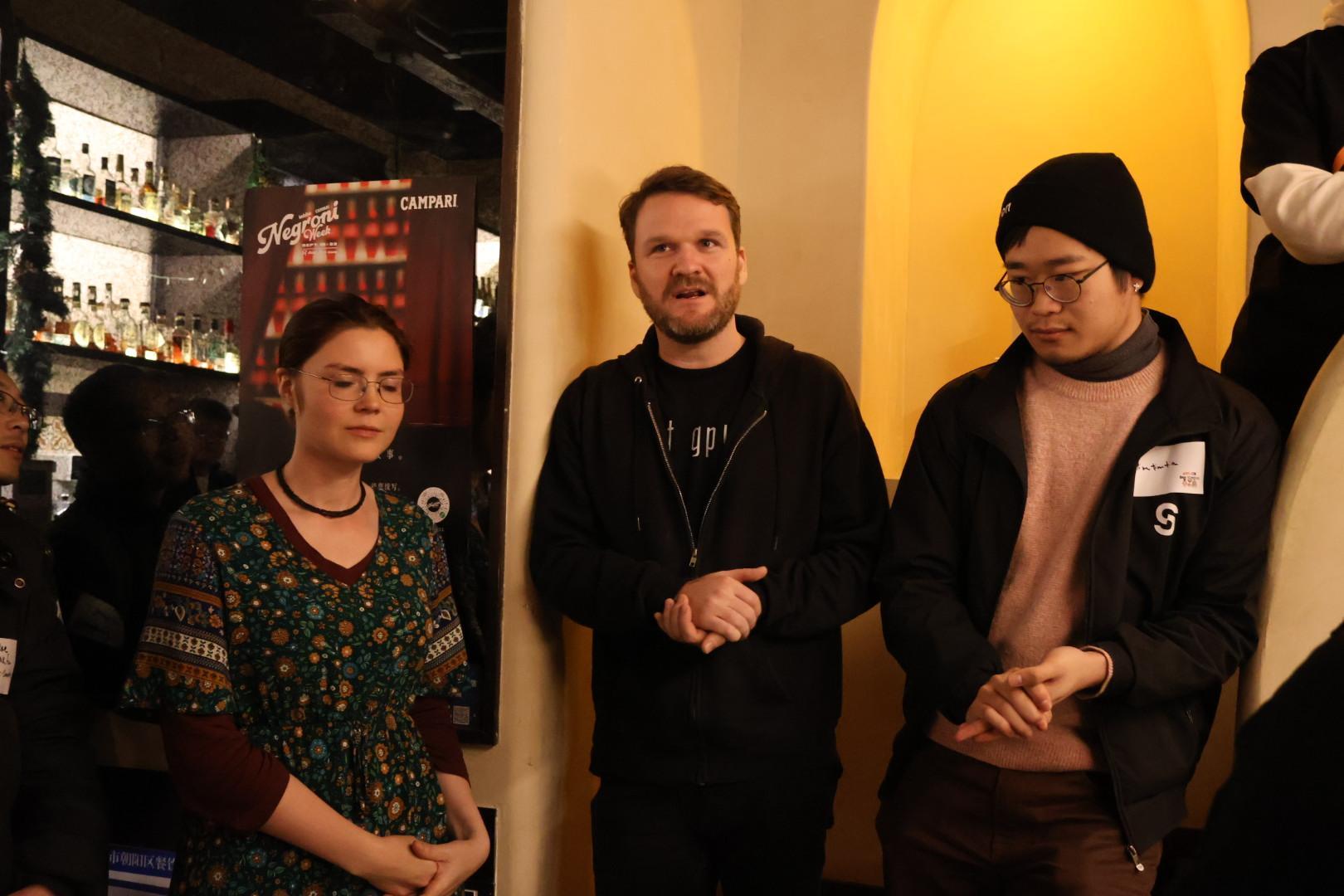
Author: Weilin, PANews
In order to get closer to the community, Shaw, who had been hiding behind the scenes and focusing on technology, stepped forward. In late December, which was the most important holiday overseas - Christmas, Shaw and his wife chose to come to China to meet with community developers. From Shanghai to Beijing and then to Hong Kong, Shaw's schedule was very tight, and he was lined up for questions at every event.
As the most popular AI agent project, ai16z's token market value has exceeded $1 billion. The core of ai16z, ElizaOS, is a powerful multi-agent simulation framework designed to create, deploy and manage autonomous AI agents. It is built with TypeScript and can interact across multiple platforms. Currently, many projects have been developed based on this highly acclaimed open source framework.
On December 26, at the ai16z community exchange event held in Beijing, PANews had an in-depth conversation with Shaw, the founder of ai16z and creator of ElizaOS, to discuss the original intention, progress and future development direction of the project, as well as his views on the future of AI Agents.
Shaw said he is not a money lover, but his development work aims to provide investment opportunities for ordinary people so that the crypto ecosystem can transform from speculative to generative, getting rid of gambling-style bets and investing in things that can truly expand the pie.
In terms of project progress, ai16z will soon announce a list of partners to improve transparency, and will announce a new proposal for ai16z token economics around January 1. Shaw believes that in order to deal with the AI hosting world, people should own their own data and models, and high decentralization is the key.
The original intention of ai16z: to give ordinary people the opportunity to become investors
In the interview, Shaw admitted that the birth of ai16z stems from his observation of the current investment landscape and his desire for fair investment opportunities. He mentioned: "If you want to invest in top startups like Uber or OpenAI, you must be an institutional investor like a16z. Ordinary people have almost no channels to access these opportunities."
Shaw believes that crypto ecosystems like Solana can move from being speculative to being generative, moving away from gambling on this token or that token, and investing in things that can actually expand the pie. Like companies and software. For example, when a16z, Paradigm or other large venture capital firms invest in software companies, they also incorporate them into their own networks and drive value. They make money because they create something extremely valuable. Shaw hopes that similar opportunities can be widely used by ordinary people and communities.
He recalled the beginnings of the project: "I worked with baoskee from daos.fun. We had lunch together, and I said, I want to make like an AI version of a16z. He said, just call it ai16z and put it together. So we started working on it immediately after lunch that day."
Latest progress: list of partners to be announced, new proposal for ai16z token economics
As ai16z's token market value exceeds $1 billion, Shaw revealed a series of exciting project dynamics. In the short term, Shaw believes that many people in the crypto field do not understand DeFi and do not understand how to use the funds in their wallets to make more profits for themselves like banks or other financial institutions. ai16z hopes to build a bridge to connect DeFi with ordinary users.
Therefore, ai16z is developing tools such as the Automatic Liquidity Pool (LP) Agent. This agent can automatically manage liquidity pools for users and help them earn income. The autonomous investor tool developed by ai16z allows the community to invest in projects they believe in. And this autonomous investor is not just determined by AI, but by the community collectively. AI listens to everyone's opinions, organizes them into an investment thesis, and then makes decisions as a representative of the community. ai16z is interested in how AI can solve many coordination and communication problems within DAOs and communities, thereby helping them make decisions together.
In addition, Shaw said that the project will officially announce the list of all partners to improve the transparency of the project and help the community more clearly understand the cooperation between the parties and their specific scope. Regarding token economics, in response to the controversy that the token economics is unclear pointed out by industry insiders, ai16z will announce a new token economics proposal around January 1. The proposal was jointly designed by professionals from multiple teams and will include LP matching mechanisms, DeFi function integration, etc. In addition, the project also revealed that they have acquired a Launchpad company, which will be used for the official release of AI agents in the future.
At the same time, the AI Pool project, which Shaw has supported many times on social media recently, has attracted market attention. Shaw said that AI Pool was created by partner Skely, so it is mainly his project, but it is built on our ElizaOS technology. It shows an application process similar to pump.fun, but this process happens in a fairer way on social media, so users don’t need to go elsewhere. This also shows a real autonomous agent that is completely autonomous-ai16z has no control over it, and he has no access to private keys. You can’t withdraw funds, you can’t manipulate it, it just runs autonomously.

Facing competition from Zerebro and ARC, I admit that they are good complements.
Shaw said projects like ARC (written in Rust) and Zerepy (written in Python) complement ai16z's work on Eliza OS very well. "I know Swarm's reputation for stealing work from famous researchers and influencing it in ways that are not actually valid. So I'm not going to include it on this list. But any real open source project and real developers who like to collaborate, I'm more than willing to work with them. I contributed to Zerepy this week. We also work with Zerebro, and even though people think it's our biggest competitor, we're actually partners."
Currently, DeFi, games, and social media are the three pillars of ai16z's work. Shaw believes that social media helps gain attention and rapid development; DeFi provides the greatest value to ordinary users, helping them to earn income more safely; games also attract a lot of interest. Currently, Treasure DAO's Smolworld and Loot Realms' Eternum are both developed using Eliza technology. Although these three are the most obvious directions, more areas may emerge in the future.
In summary, Shaw's advice to project owners and users is that anything that can help users make money, save money or improve their lives will definitely stand out. "I think just promoting a token, like posting a lot of messages and swiping on Twitter, these may not be as important as before, especially when there are more and more agents. The focus will be more on what this agent can do and what it can do for me. So, we should focus on lowering the barrier to use things like financial products, bringing applications that originally required website access to social platforms, and making the user experience simpler overall."
Future trends: Different stages of AI agents, how to deal with AI taking over the world
At present, AI agents have gone through different stages of development, from the initial meme to the expansion to social networking, and then to infrastructure and investment analysis. In Shaw's view, the biggest trend he sees is that websites are migrating to social media.
All the things that people used to visit websites for, they can now probably do through proxies on social media. So this trend shows that people are looking for ways to integrate apps directly into social media. He said that he had talked to someone who developed a travel booking agent earlier, and we are also working with someone who developed a real estate booking system. An obvious DeFi example is Clanker, which was developed for Farcaster. I think this is a good example of this trend, where you put the pump.fun model directly on social media to form a social casting experience, which is more fun, has the characteristics of self-promotion and self-marketing, and users don't have to leave the social platform when using the app. I think there will be thousands of apps following this trend in the future.
Speaking of the future, Shaw emphasized that diversity and high decentralization are the key to preventing AI from taking over the world. He said that decentralization can ensure that each community has full control over its agents and can effectively deal with the risk of AI taking over.
“ I think the most important thing is diversity, having AI agents that are very different from each other. They use different models, strategies, and approaches, built by different teams with different incentives, so that you can create a stronger network and make it very difficult for any one AI to take over. It’s very important that all of this is highly decentralized and that we own our own data and models, and that each community has full control over its own agents. So that in the hypothetical case of some kind of AI taking over, that AI has to fight against many other AIs. There shouldn’t be just one superintelligent AI, there should be many superintelligent AIs, so that it becomes much more difficult for any one AI to have some kind of advantage.”















